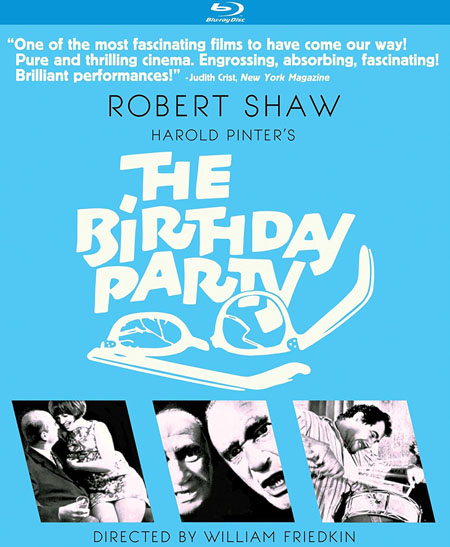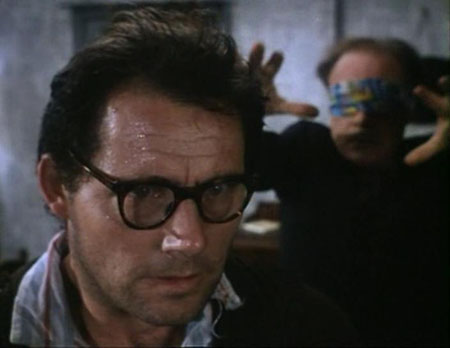
“REVISITING THE
COMEDY OF MENACEâ€
By Raymond Benson
Harold
Pinter was one of the groundbreaking playwrights that emerged out of the 1950s,
along with Samuel Beckett, Eugene Ionesco, and a handful of others. They changed
the landscape of what audiences could expect on the stage. Pinter’s first
decade of remarkable plays (and a few screenplays) fall into a category dubbed
by critics as “comedies of menace.†They feature (usually) working-class
Britons in situations in which an ambiguous threat lies underneath the surface
of an otherwise mundane existence. The subtext
is everything in a Pinter play. Known for the pauses in dialogue
(specifically designated in the scripts), Pinter was able to pack weighty
meaning in what is not said, more so
than perhaps any other modern playwright.
The Birthday Party was his first
full-length play (written in 1957, premiered in 1958) and is one of his
most-produced and well-known works—although probably not so much by anyone who
isn’t an aficionado of the theatre. You’re not going to see a production of The Birthday Party at your local high
school. The Homecoming (1967) won
Pinter the Tony Award, and, for my money, is his greatest work (it was
brilliantly filmed by Peter Hall in 1973 for the American Film Theatre
experiment). As a screenwriter, Pinter’s work on The French Lieutenant’s Woman (1981) and Betrayal (1983) received Oscar nominations, and he received the
Nobel Prize shortly before his death.
Young
filmmaker William Friedkin, who had yet to make The French Connection and The
Exorcist, had seen a production of The
Birthday Party in England in the early 60s and, by his account, was knocked
out by it. He personally met with Pinter to convince the elusive playwright to
allow him to adapt the play into a film. It took some doing, but finally Pinter
relented and wrote the screenplay himself. The picture was produced on a
shoestring budget, but Friedkin managed to employ several outstanding British
actors—many of whom were already a part of Pinter’s unofficial “repertory
company.â€
For
those familiar with Pinter, the results are outstanding. For everyone else—The Birthday Party could very well be a
bewildering experience.
Robert
Shaw stars as Stanley, a nervous boarder in a seaside village rooming house run
by Meg (Dandy Nichols) and Petey (Moultrie Kelsall). It may—or may not
be!—Stanley’s birthday. Enter two mysterious new boarders, Goldberg (Sydney
Tafler) and McCann (Patrick Magee), whom we know have an agenda with Stanley
but we’re never sure what it really is. We just know it’s a threat, and they
make things very uncomfortable for him… and the audience. Shaw and Magee,
especially, deliver riveting performances.

To
say more would be a disservice to the viewer and to Pinter, for much of the
power of The Birthday Party is its
mystery and ambiguity. Just know that by embarking on this journey you will be
entering a heightened realism in which characters never say what they mean and what
they don’t say means more. As an adaptation of Pinter’s play, Friedkin’s The Birthday Party is quite faithful and
potent.
Kino
Lorber’s new Blu-ray presents a 1080p transfer that looks fair enough for its
age and intentionally drab cinematography and setting. The nearly half-hour supplemental
interview with director Friedkin is fascinating—he relates the entire history
of how he got involved with Pinter and the film, and he throws in anecdotes
about the playwright and a few other characters (like Joseph Losey). Theatrical
trailers for this and other Kino Lorber releases—many related to Pinter—are
also included.
The Birthday Party will certainly be
appreciated by those of us who were theatre majors many years ago, and by the
art house cinema crowd. For others, the picture might be an acquired taste.
CLICK HERE TO ORDER FROM AMAZON